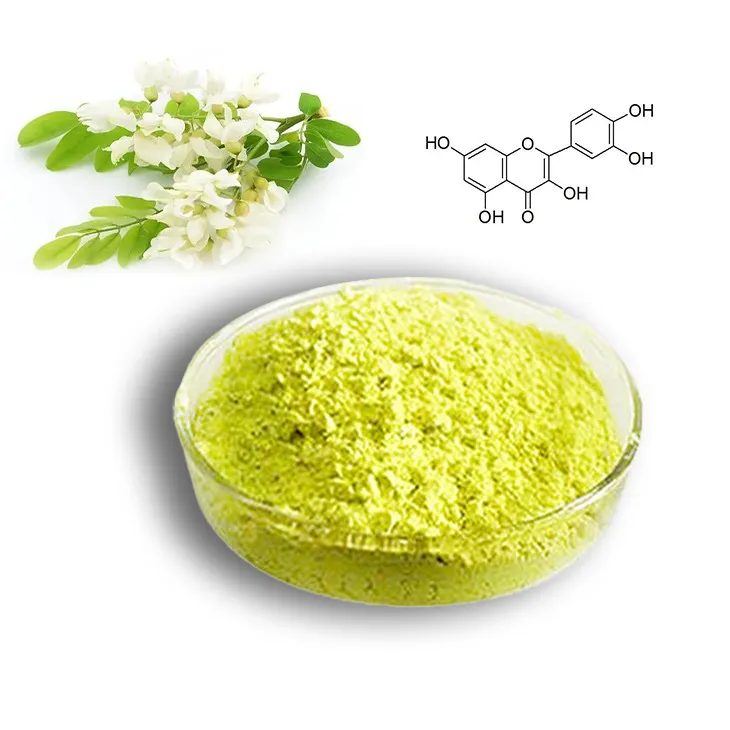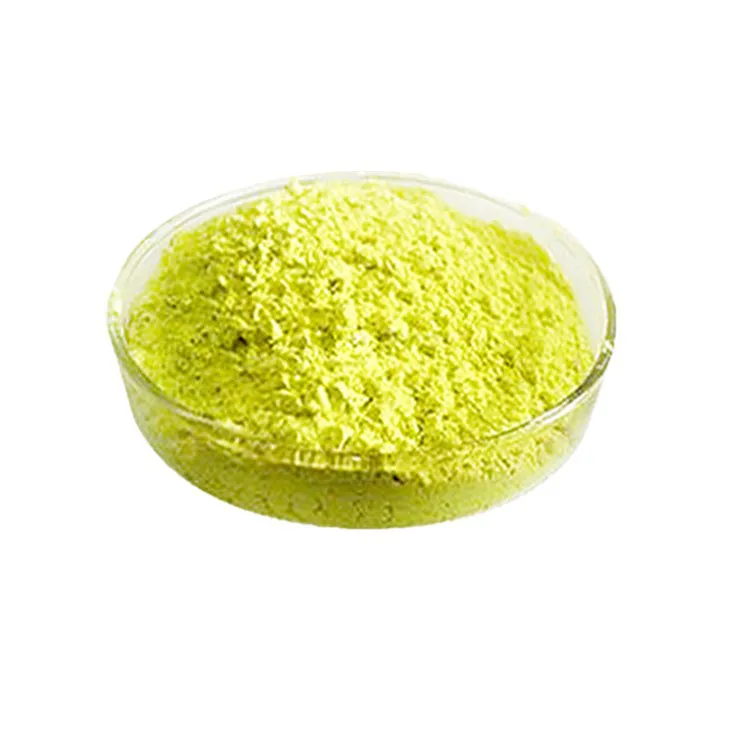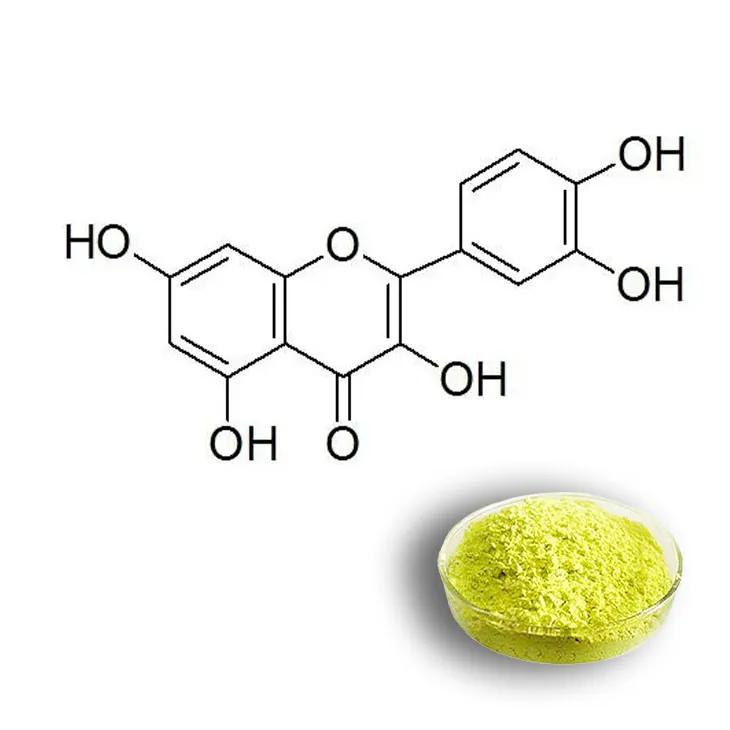- 0086-571-85302990
- sales@greenskybio.com
The Astonishing Benefits of Organic Quercetin.
2024-11-12

1. Introduction to Organic Quercetin
Organic Quercetin is a flavonoid that is found in many fruits, vegetables, and grains. It is known for its antioxidant properties and has been the subject of numerous scientific studies in recent years. Quercetin is naturally present in foods such as apples, onions, and berries, but it can also be taken in supplement form for those who want to increase their intake.

2. The Role in Enhancing the Immune System
One of the most important benefits of organic quercetin is its role in enhancing the immune system. The immune system is the body's defense against diseases, and a strong immune system is essential for good health. Quercetin helps to boost the immune system by increasing the production of white blood cells, which are responsible for fighting off infections.
In addition to increasing white blood cell production, quercetin also has anti - inflammatory properties. Inflammation is a natural response of the body to injury or infection, but chronic inflammation can lead to a variety of health problems. By reducing inflammation, quercetin helps to keep the immune system in balance and prevent it from overreacting.
Studies have shown that quercetin can be effective in preventing and treating viral infections. For example, one study found that quercetin was able to inhibit the replication of the influenza virus in vitro. Another study showed that quercetin supplementation reduced the severity and duration of cold symptoms in healthy volunteers.

3. Potential Anti - Cancer Properties
Another area of interest in the study of organic quercetin is its potential anti - cancer properties. Cancer is one of the leading causes of death worldwide, and there is a great need for new and effective cancer treatments. Quercetin has been shown to have anti - cancer effects in a variety of ways.
One way that quercetin may fight cancer is by inhibiting the growth of cancer cells. In vitro studies have shown that quercetin can stop cancer cells from dividing and multiplying. It may also induce apoptosis, or programmed cell death, in cancer cells. This is an important mechanism for eliminating cancer cells from the body.
Quercetin may also have anti - angiogenesis properties. Angiogenesis is the process by which new blood vessels are formed. Cancer cells need a blood supply to grow and spread, so by inhibiting angiogenesis, quercetin can starve cancer cells of the nutrients and oxygen they need to survive.
In addition to these direct effects on cancer cells, quercetin may also help to prevent cancer by reducing oxidative stress and inflammation in the body. Oxidative stress and inflammation are known to play a role in the development of cancer, so by reducing these factors, quercetin may lower the risk of developing cancer.

4. Improvement of Respiratory Health
Organic quercetin can also have a significant impact on respiratory health. For those with asthma or other breathing problems, quercetin may provide much - needed relief. Quercetin has been shown to have anti - inflammatory effects in the airways, which can help to reduce swelling and improve breathing.
In addition to its anti - inflammatory properties, quercetin may also help to protect the lungs from damage caused by environmental pollutants. Air pollution is a major risk factor for respiratory diseases, and quercetin may help to counteract the harmful effects of pollutants on the lungs.
One study found that quercetin supplementation improved lung function in smokers. Smoking is a major cause of lung damage, and this study suggests that quercetin may be able to help repair some of the damage caused by smoking.

5. Cardiovascular Health Benefits
Quercetin also offers several benefits for cardiovascular health. It has been shown to have antioxidant properties that can protect the heart and blood vessels from damage caused by free radicals. Free radicals are unstable molecules that can cause oxidative stress, which is linked to a variety of cardiovascular diseases.
Quercetin may also help to lower blood pressure. High blood pressure is a major risk factor for heart disease and stroke. Studies have shown that quercetin can relax blood vessels, which can lead to a reduction in blood pressure.
Another way that quercetin may benefit cardiovascular health is by reducing cholesterol levels. High cholesterol is another risk factor for heart disease. Quercetin has been shown to lower LDL ( "bad" ) cholesterol levels while increasing HDL ( "good" ) cholesterol levels in some studies.
6. Anti - Diabetic Effects
There is also evidence to suggest that organic quercetin may have anti - diabetic effects. Diabetes is a chronic disease that affects the body's ability to regulate blood sugar levels. Quercetin may help to improve insulin sensitivity, which is the body's ability to respond to insulin.
By improving insulin sensitivity, quercetin can help to lower blood sugar levels. This is important for people with diabetes, as high blood sugar levels can lead to a variety of complications, including nerve damage, kidney damage, and heart disease.
In addition to improving insulin sensitivity, quercetin may also help to protect the pancreas from damage. The pancreas is the organ that produces insulin, and damage to the pancreas can lead to a decrease in insulin production. By protecting the pancreas, quercetin may help to maintain normal insulin production.
7. Neuroprotective Properties
Organic quercetin may also have neuroprotective properties. The nervous system is a complex network of cells that is responsible for transmitting signals throughout the body. As we age, the nervous system can become damaged, which can lead to a variety of neurological disorders, such as Alzheimer's disease and Parkinson's disease.
Quercetin has been shown to have antioxidant and anti - inflammatory properties in the nervous system. These properties can help to protect nerve cells from damage caused by free radicals and inflammation.
In addition, quercetin may also help to improve cognitive function. Some studies have shown that quercetin supplementation can improve memory and learning in animal models. While more research is needed in humans, these findings suggest that quercetin may have potential as a natural treatment for age - related cognitive decline.
8. Anti - Aging Effects
Quercetin also has anti - aging effects. As we age, our bodies become more susceptible to oxidative stress and inflammation, which can lead to a variety of age - related diseases. Quercetin can help to combat these processes by its antioxidant and anti - inflammatory properties.
In addition to its effects on oxidative stress and inflammation, quercetin may also help to protect the skin from aging. The skin is the body's largest organ, and it is constantly exposed to environmental factors that can cause damage. Quercetin may help to reduce wrinkles, improve skin elasticity, and protect the skin from UV damage.
9. How to Incorporate Organic Quercetin into Your Diet
There are several ways to incorporate organic quercetin into your diet. One of the easiest ways is to eat foods that are rich in quercetin, such as apples, onions, berries, and green tea. These foods can be easily incorporated into your daily meals and snacks.
Another option is to take quercetin supplements. Quercetin supplements are available in capsule, tablet, and powder form. When choosing a supplement, it is important to look for a high - quality product that is organic and free from additives and fillers.
It is also important to note that while quercetin has many potential benefits, it should not be used as a substitute for medical treatment. If you have a medical condition, it is always best to consult with your doctor before starting any new supplement or dietary change.
10. Conclusion
In conclusion, organic quercetin has a wide range of astonishing benefits. From enhancing the immune system to potentially fighting cancer, improving respiratory health, and offering protection against various chronic diseases, quercetin is a powerful flavonoid. Whether through dietary sources or supplements, incorporating quercetin into your lifestyle may contribute to better overall health and well - being.
FAQ:
What is organic quercetin?
Organic quercetin is a type of flavonoid. It is a natural compound found in many plants, such as fruits, vegetables, and grains. It is known for its various health - promoting properties.
How does organic quercetin enhance the immune system?
It can enhance the immune system in several ways. For example, it has antioxidant properties that help to neutralize harmful free radicals in the body. This can reduce oxidative stress on immune cells and support their normal function, making the body more capable of fighting off diseases.
What evidence is there for the anti - cancer properties of organic quercetin?
In some laboratory and pre - clinical studies, quercetin has been observed to interfere with the growth and spread of cancer cells. It may work by inhibiting certain enzymes or signaling pathways that are involved in cancer cell survival and proliferation. However, more research, including clinical trials, is needed to fully confirm its potential as an anti - cancer agent.
How can organic quercetin improve respiratory health?
For respiratory health, quercetin may have anti - inflammatory effects in the airways. It can help to reduce inflammation that is often associated with asthma and other breathing problems. This may lead to improved lung function and reduced symptoms such as wheezing and shortness of breath.
Are there any side effects of taking organic quercetin?
In general, when taken in appropriate amounts as a supplement, quercetin is considered safe for most people. However, some individuals may experience mild side effects such as stomach upset, headache, or tingling sensations. High - dose supplementation may also interact with certain medications, so it is advisable to consult a healthcare provider before starting quercetin supplementation.
Related literature
- The Role of Quercetin in Health and Disease"
- "Quercetin: A Promising Natural Compound for Immune Support"
- "Anti - Cancer Effects of Quercetin: Current Research and Future Perspectives"
- ▶ Hesperidin
- ▶ citrus bioflavonoids
- ▶ plant extract
- ▶ lycopene
- ▶ Diosmin
- ▶ Grape seed extract
- ▶ Sea buckthorn Juice Powder
- ▶ Beetroot powder
- ▶ Hops Extract
- ▶ Artichoke Extract
- ▶ Reishi mushroom extract
- ▶ Astaxanthin
- ▶ Green Tea Extract
- ▶ Curcumin Extract
- ▶ Horse Chestnut Extract
- ▶ Other Problems
- ▶ Boswellia Serrata Extract
- ▶ Resveratrol Extract
- ▶ Marigold Extract
- ▶ Grape Leaf Extract
- ▶ blog3
-
High purity olive leaf extract
2024-11-12
-
Lavender oil extraction method
2024-11-12
-
100% organic virgin sea buckthorn fruit oil
2024-11-12
-
Lotus leaf extract powder factory in China
2024-11-12
-
China aged garlic extract supplier
2024-11-12
-
Deer antler extract powder manufacturer
2024-11-12
-
Saw palmetto extract vs whole herb
2024-11-12
-
Sophora Flavescens Root Extract
2024-11-12
-
Diosmin
2024-11-12
-
Fenugreek Extract Powder
2024-11-12
-
Tinospora cordifolia extract
2024-11-12
-
Ginger Extract
2024-11-12
-
Dandelion Leaf Extract
2024-11-12
-
Giant Knotweed Extract
2024-11-12
-
Hops Extract
2024-11-12
-
Polygonum Cuspidatum Extract
2024-11-12
-
White Willow Bark Extract
2024-11-12





















